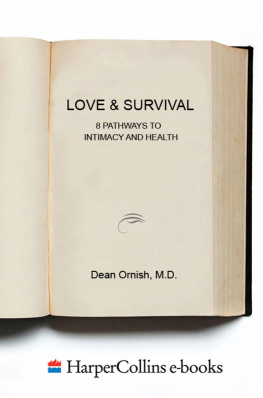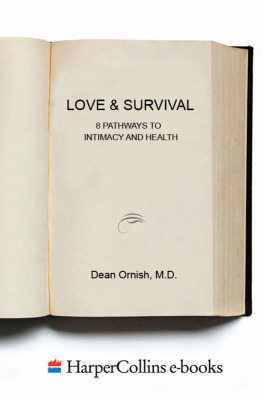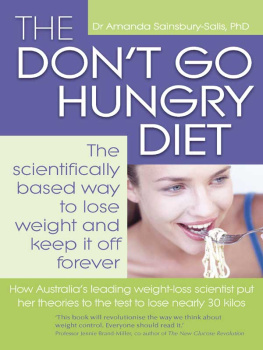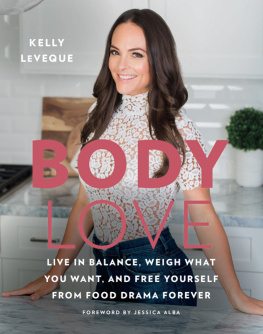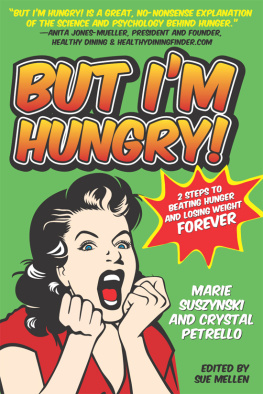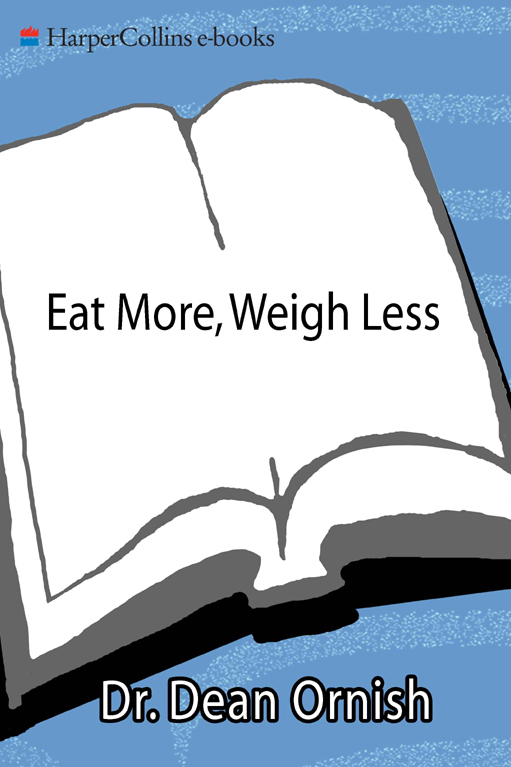MORE FOR EAT MORE, WEIGH LESS BY DEAN ORNISH, M.D.
If you were to read only one book on diet and nutrition, this should be it. Dr. Ornish raises this subject to a new level. This book will change your body, mind, and health.
Larry Dossey, M.D., author of Meaning and Medicine
This book presents a compelling philosophy of life that will revolutionize your relationshipsto yourself, to your loved ones, and to the universe.
Joan Borysenko, Ph.D., author of Minding the Body, Mending the Mind
Dr. Ornish provides the scientific research supporting his recommendations. If Americans followed his advice, the health of our nation would experience tremendous improvement.
John Foreyt, Ph.D., and Ken Goodrick, Ph.D., Baylor College of Medicine
Dr. Ornish has done it again! His program is sound science, is very practical, and is very personal. It makes sense in every way. This book is must reading.
T. Colin Campbell, Ph.D., Jacob Gould Schurman Professor of Nutritional Biochemistry and Director, China Diet Health Project, Cornell University
Eat More, Weigh Lessis a terrific guide and inspiration on how and why to eat less fat. In our high-tech health care system, this is a do-it-yourself primary care preventive medicine lay text.
John D. Stoeckle, M.D., Professor of Medicine, Harvard Medical School
Jack Weekly, the president of Mutual of Omaha, said that Dr. Ornishs program is a model for the preventative treatments that are critical for better quality, more economical health care.
New York Times
Ornish explains how and why the foods we eat make us not only fat but also weak and susceptible to disease. Youll learn the latest on why yo-yo dieting ultimately fails; why moderate exercise is more effective than heart-pumping aerobics for weight loss; and some different ways to nourish your soul without a visit to the refrigerator.
Longevity
Startling as it sounds, Eat more, weigh less, can make sense. His diet is easy to grasp. Despite several lapses over the course of the month, our dieters lost from three to six pounds. The dieter who stuck with it most faithfully was hoping to lower her high cholesterol count. In one month, her cholesterol plummeted from 270 to 160. At the two week point, several of the women said they felt more energetic. Cravings aside, all participants found the diet relatively easy to follow at home.
Glamour
Thanks to Ornishs ultra-low-fat Advantage Ten program, you can eat more, eat more frequently, and still lose weight simply, safely, and easily. The highlight of the book is the lineup of creative low-fat recipes. Ornish proves beyond a doubt that there is flavor after fat.
Janice Schindeler, Houston Post
I wrote Eat More, Weigh Less in 1993 in hopes that it would help people lose weight, feel better, and become healthier. Since then, I have received thousands of letters every year from people who have lost weight and kept it off.
Recently, for example, a man named Mark Nichols came to my office and showed me a photograph of how he looked two years earlier. I hardly recognized himbecause he weighed 335 pounds then and only 165 pounds now. He lost 170 pounds by following the program outlined in Eat More, Weigh Less and has not regained it.
I find it gratifying to know that when people make the diet and lifestyle changes I recommend, they not only lose weight but also improve their health and well-being. Thats why I wrote Eat More, Weigh Less, to provide a doorway to better health as well as the easiest and most optimal way to lose weight and keep it off. Safely. Simply. Easily. Without hunger, and with feelings of abundance rather than deprivation.
In 1998, my colleagues and I at the non-profit Preventive Medicine Research Institute published our research findings in the Journal of the American Medical Association. We found that most of the study participants were able to maintain comprehensive diet and lifestyle changes for at least five years.
You can lose weight on just about any diet. Keeping it off is a lot harder. A few years ago, the government reviewed all the different weight-loss plans. They found that two-thirds of people gained back all the weight they lost within a year, and 97 percent gained it all back within five years.
However, we found in our research that the average person lost twenty-four pounds in the first year and kept off more than half that weight five years later, even though they were eating more food, and more frequently, than before. Without hunger or deprivation. Simply. Safely. Easily. And they werent even trying to lose weight.
They not only felt better, they were better. We also found that they had even more reversal of heart disease after five years than after one year, and two-and-a-half times fewer cardiac events, including heart attack, stroke, bypass surgery, and angioplasty. The more closely people followed the program, the better they were. Clearly, if you can reverse heart disease by eating this way, then you can help prevent it as well.
In contrast, the randomized comparison group (who were making more moderate changes in diet and lifestyle with a 30 percent fat diet) showed progression (worsening) of their heart disease after one year and became even worse after five years. They also gained weight during the study.
A few months earlier, my colleagues and I published the results of the Multicenter Lifestyle Demonstration Project in the American journal of Cardiology. In the past, lifestyle changes have been viewed only as prevention, increasing costs in the short run for a possible savings years later. Now, our program is offered as a scientifically proven alternative treatment to many patients who otherwise were eligible for coronary artery bypass surgery or angioplasty, resulting in an immediate and substantial cost savings.
In brief, we found that almost 80 percent of people who were eligible for bypass surgery or angioplasty were safely able to avoid it by making comprehensive lifestyle changes in the hospitals we trained. Mutual of Omaha calculated an immediate savings of almost $30,000 per patient. These patients reported reductions in angina (chest pain) comparable to what can be achieved with bypass surgery or angioplasty without the costs or risks of surgery.
More recently, Highmark Blue Cross Blue Shield has been providing as well as covering this diet and lifestyle program. Their results have been spectacular: of the first 300 patients, 299 avoided bypass surgery or angioplasty.
By now, you might be saying, Hey, I dont have heart disease, Im just trying to lose weight. But if it works this well to reverse heart disease, imagine how well it can work to help keep you healthy in other ways.
Increasing evidence shows that the Eat More, Weigh Less diet may help to prevent a wide variety of other illnesses including breast cancer in women, prostate cancer in men, colon cancer, lung cancer, lymphoma, osteoporosis, diabetes, hypertension, and so on, in addition to enabling you to lose weight and to keep it off.


